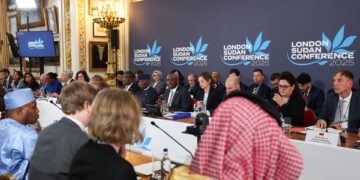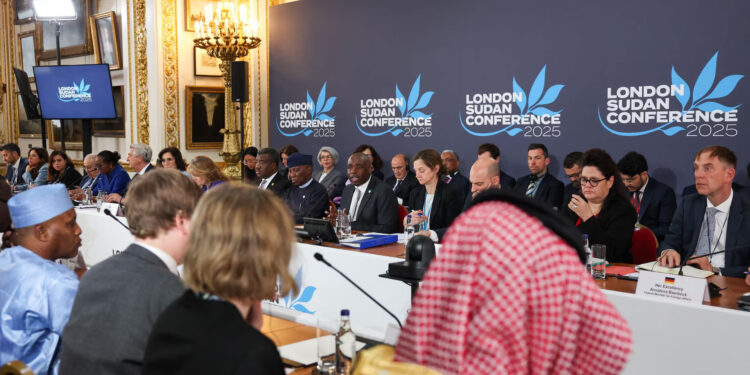By Lucy Adautin
Britain and the European Union pledged hundreds of millions of pounds on Tuesday to help alleviate the humanitarian catastrophe in Sudan, marking two years since civil war erupted in the country. The conflict has claimed tens of thousands of lives, displaced 14 million people, and pushed swathes of the population into famine.
Despite the show of solidarity at the London-hosted conference, which the United Nations has labelled the world’s worst humanitarian crisis, no significant diplomatic progress was made towards ending the conflict.
The African Union, co-hosting alongside the UK, France, Germany, and the EU, urged an immediate end to hostilities. However, UK Foreign Secretary David Lammy admitted that securing peace would demand time, sustained international effort, and “patient diplomacy.”
There had been hopes ahead of the meeting that an international coalition could be formed to lead peace talks. Instead, the conference concluded without a joint communique from all attendees, only a final statement from the host nations and institutions was issued.
While no unified diplomatic front was announced, the hosts acknowledged that neighbouring countries were directly impacted by the conflict and reiterated support for efforts to reach a resolution.
Altogether, more than £813 million (over $1 billion) was pledged for Sudan and its neighbours this year, including €522 million ($590 million) from the EU and its member states, and £120 million ($158 million) from the UK.
However, Avaaz, a global advocacy group, dismissed the conference as a failure. “David Lammy promised Sudan would not be forgotten. Today was a test of that commitment and of the foreign secretary he aims to become, especially in the absence of US leadership. He failed dismally,” said Will Davies, head of Avaaz’s Sudan team.
The conference welcomed officials from Western governments, international bodies, and regional states, but notably excluded any Sudanese representation. Neither the national military nor its rival, the paramilitary Rapid Support Forces (RSF), received invitations.
Sudan spiralled into civil war on 15 April 2023, following escalating tensions between the army and the RSF. The conflict began in Khartoum and rapidly engulfed much of the country, resulting in at least 20,000 deaths though the true toll is believed to be far higher.
Last month, Sudan’s military regained control of the capital in a symbolic victory. However, the RSF retains control over much of Darfur and other regions.
Western powers, including the UK, hold limited sway over the conflict. Greater influence lies with regional actors such as Egypt, which has historical ties with the Sudanese army, and the United Arab Emirates, accused of supplying arms to the RSF, a charge it denies despite mounting evidence.
Sudan’s government criticised the organisers for excluding it while inviting the UAE. Lana Nusseibeh, the UAE’s assistant minister for political affairs, condemned atrocities committed by both sides and called for an end to attacks on humanitarian workers, as well as the shelling of schools, markets, and hospitals.
The United States was represented at the conference, though its international aid contributions have been significantly reduced in recent years. Britain has also cut its aid budget from 0.5% to 0.3% of GDP to finance increased military spending. Nonetheless, Prime Minister Keir Starmer has affirmed that Sudan, alongside Ukraine and Gaza, will remain a priority for British foreign aid.




































